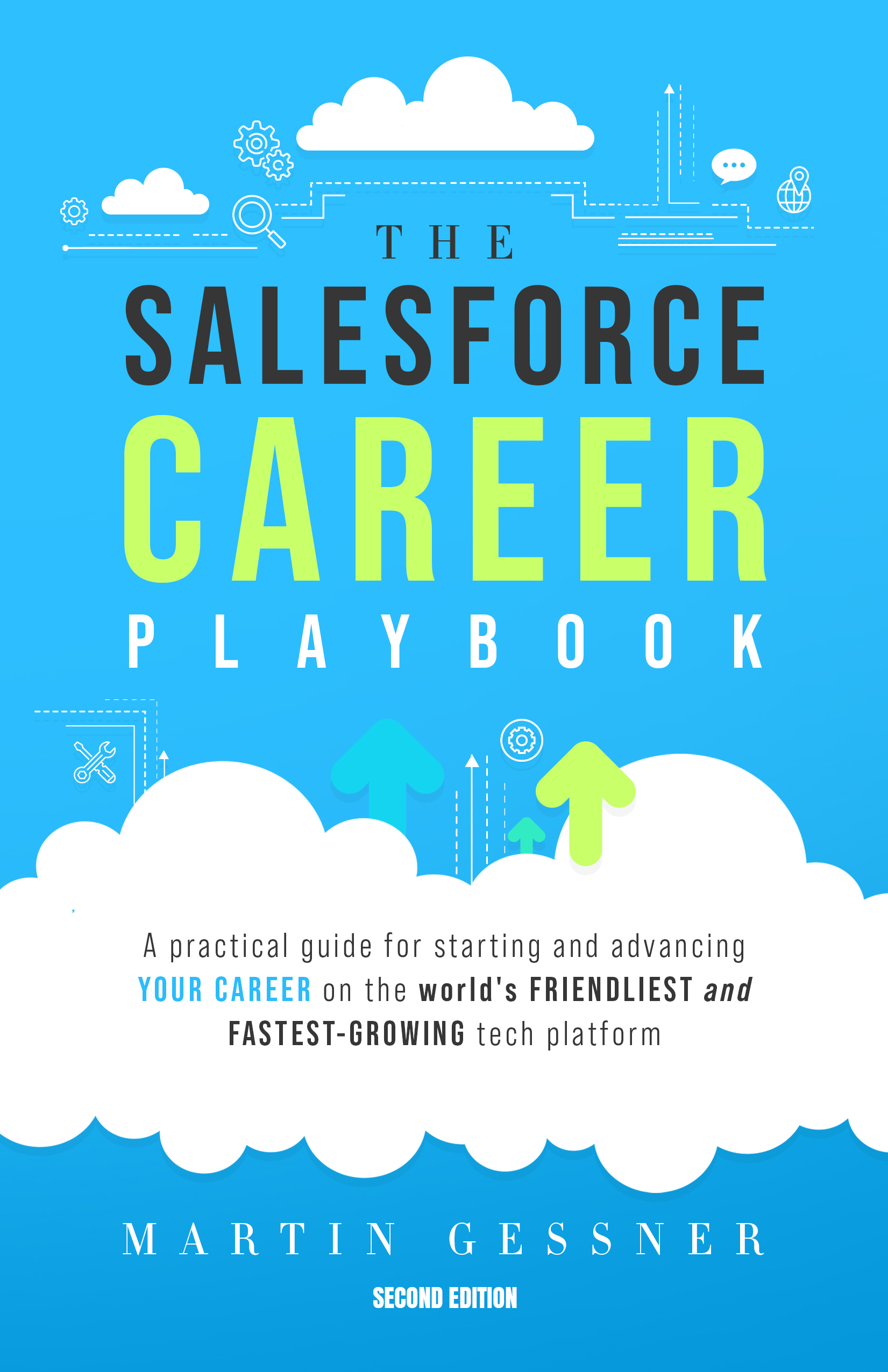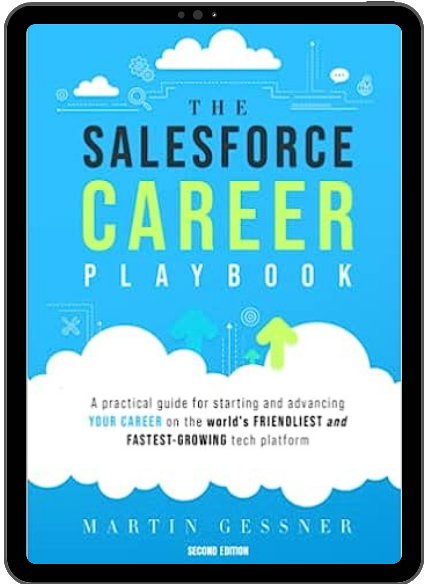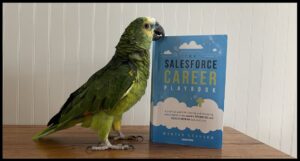

Highly Rated Book
4.7 Rating

Learn from the Best in the Field
Real-life case studies

Actionable Strategies
Easy to follow guides
This book is the missing link … and should be required reading for anyone looking to launch or grow a career within the Salesforce ecosystem.”
—Selina Suarez, Executive director/founder, PepUp Tech

“Whether you are a newbie, a career-changer, or advancing in your career, this book will help you find and take the next step.”
—Ben Duncombe, Director and Salesforce recruitment specialist at Talent Hub
The Salesforce Career Playbook

Are you tired of feeling overwhelmed by the volume of complex information, missing out on job opportunities, and experiencing frustration with limited career growth in Salesforce?
The Salesforce Career Playbook is your solution.
It simplifies the complex, allowing you to have both – less confusion and more success in your chosen Salesforce career.
What you will learn from this book

Discover Your Path to Success
Explore lucrative Salesforce careers and find the perfect fit for you.

Master the Winning Formula
Gain essential skills and traits that guarantee success in your chosen career path.

Get Ahead of the Competition
Ace certifications, impress in interviews, and develop critical soft skills for a competitive edge.

Learn from Real-Life Triumphs
Draw inspiration from 40 real-life stories of accomplished Salesforce professionals.

Insider Wisdom for Your Journey
Benefit from exclusive advice gathered from industry experts.

What They’re Saying
Customer Testimonials
I highly recommend Martin Gessner’s The Salesforce Career Playbook for those who are new to the Salesforce ecosystem, those who are already Salesforce professionals and are seeking to advance their careers, or those who are serving as mentors to others.
“Find Your Path”
This book is an excellent resource to not only find your path which can seem daunting at times with the vast diversity of careers inside of the ecosystem but also gives you tangible tips to excel once your aim is clear.
The Salesforce Career Playbook by Martin Gessner both helped me understand my place in the Salesforce ecosystem and where I wanted to be in the future, along with inspiring me to get more involved in my local Admin User Group and start my blog.

About the author
Martin Gessner spent ten years working with various Salesforce roles, including business analyst, project manger, consultant and solution architect. Along the way he earned twelve different Salesforce certifications to move up the career ladder.
Connect with Martin
Look Inside
PART ONE: Overview of Salesforce Roles
What exactly are the jobs in the world of Salesforce? Firms have varying names for different positions within their specific ecosystems, making it impossible to cover every single job out there.
In Part One of this book we will cover the five roles that come up most often on job boards. Each role will be described in full in one of the five chapters of this section.
• Chapter One: Administrator
• Chapter Two: Developer
• Chapter Three: Business Analyst
• Chapter Four: Consultant
• Chapter Five: Architect
We also cover:
• The average annual salary and salary range,
• The job description,
• The technology-related requirements necessary for the job,
• The general business and “soft” skills necessary for the job,
• Tips for obtaining a job in each of these roles, and
• A day in the life of someone working in each of these roles.
PART TWO: Career Paths
The more information you collect about a career path, the more educated your choice will be. Choosing your career path is as much an inward-facing discovery process as it is an external, experiential one. To make the best decisions that guide you forward, you can look inward at your own unique constellation of preferences, strengths, and personality traits, as well as outward to collect details from other people who have information about the career path or paths you are considering.
In this section we will consider the different factors you can use in your internal discovery process. We will then provide detailed information about the differing career paths, including case studies from people who are working in functional, technical, consulting, and entrepreneurial careers. Finally we include review tips for entering the Salesforce ecosystem.
PART THREE: Technical Skills and Certifications
Ultimately, your ability to move forward in a Salesforce-related career will be determined by two skill sets: 1) Your technical skills, which are based on your training and experience (and can be showcased through project experience and certifications); and 2) your soft skills, which are the unquantifiable attributes that enable an employee to work with others, manage stress, and persist despite obstacles.
This section covers technical skills and ways to demonstrate these skills. Chapter Twelve guides you on the resources for gaining technical skills. Chapter Thirteen discusses certifications, why they are important, and what the certification process entails. Chapter Fourteen helps you proactively manage your Salesforce career.
PART FOUR: Soft Skills
In Part Four we cover soft skills, which are what will allow you to advance in your career. While your technical skills might be enough to help you land a job, your soft skills give you longevity and vertical mobility.
Due to the changing nature of technology, which disrupts entire industries every few years, the hard skills, abilities, and expertise that you have today will be irrelevant in a few years. Your employers know this, so more important to them than your technical skills are the soft skills you have that make you coachable.
Being coachable means that you make room to learn new skills, to improve upon your existing skills, and to grow as a person. It means you are willing to transform when transformation is necessary. It means you are able to walk away from things that are not working and embrace things that are. Whereas your hard skills determine what you can accomplish today, the degree to which you can be coached predicts your future performance.
Certain soft skills are more important for certain roles. For instance, a business analyst, who is acting as a bridge between IT and the end-user, needs empathy, communication, and conflict management skills all day long. A technical developer, though, has less of a need for these soft skills, though agility is certainly important given that Salesforce releases updates regularly.
Yet, everyone needs to be coachable, particularly if they want to advance in their careers. Developers who want to become technical leads, for instance, might need to improve their communication and presentation skills. Their ability to grow and develop these new skills will depend upon the degree to which they are coachable.
Soft skills, then, are arguably as important as the hard skills you can gain through experience or certification. Certainly, if you plan to move up the ladder, you need soft skills beyond your technical proficiency. The good news is this: Soft skills might seem intangible, but they can be taught, and they can be learned. In this section, we take a look at the five soft skills that are necessary in certain Salesforce roles, and that will always make a person become more coachable.
The soft skills covered are:
• Chapter Fifteen: Agility
• Chapter Sixteen: Communication
• Chapter Seventeen: Conflict Resolution
• Chapter Eightteen: Feedback
• Chapter Nineteen: Self-Efficacy


